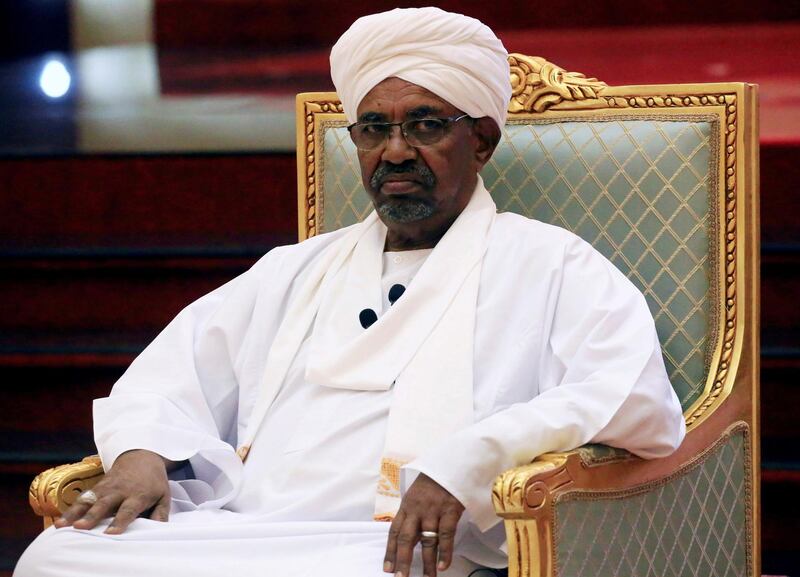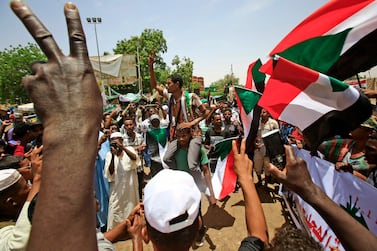Unceremoniously overthrown and jailed, Sudan’s Omar Al Bashir now faces questioning over accusations of money laundering and sponsoring terrorism, surprising activists and analysts who point out that the former Islamist leader is accused of much more serious offences.
In 2010, for example, the International Criminal Court indicted Al Bashir for genocide in Darfur, the western Sudanese region where forces loyal to the Khartoum government crushed a rebellion by ethnic Africans. The conflict there left at least 300,000 people dead and displaced another two million, according to the United Nations.
Militias loyal to Al Bashir, as well as segments of the armed forces, were accused of a wide range of atrocities in Darfur, including mass rape, scorched earth tactics and extrajudicial killings.
More recently, Al Bashir is blamed for ordering his security forces to use live ammunition against unarmed protesters during the four months of unrest that preceded his April 11 overthrow by the military. The violence left at least a 100 people dead and thousands injured or detained and tortured in jail. He is also accused of ordering the use of deadly force to break-up a sit-in protest outside the headquarters of the Sudanese armed forces in Khartoum. Security forces made repeated attempts to disperse the sit-in, using deadly force at times. The presence of soldiers protecting the protesters is likely to have prevented an all-out attack.
Sudanese authorities have given no details on the accusations facing Al Bashir, but the money laundering charge appears linked to the discovery last month of more than $100 million (Dh367.3m) in Sudanese pounds, euros and dollars at the former president's Khartoum residence.
Earlier in April, a senior member of the ruling transitional military council said authorities had prevented the former leader from smuggling large amounts of cash out of the country. Again, no further details were given.
Similarly, little has been said publicly about the accusation of sponsoring terrorism, but the charge appears linked to Al Bashir’s alleged support to radical Islamic groups including Hamas, Hezbollah, and Islamic militants in neighbouring Libya.
Al Bashir also has a history of providing a safe haven for militant Egyptian groups, including a cell blamed for the failed assassination attempt against Egypt's former president Hosni Mubarak in 1995 in neighbouring Ethiopia. More recently, the general-turned-president has offered asylum to hundreds of wanted members of Egypt's now-outlawed Muslim Brotherhood, many of whom later settled in Turkey or Qatar. The military in Egypt ousted President Mohammed Morsi of the Brotherhood in 2013 amid a wave of street protests against his divisive rule.
Al Bashir is also believed to have tolerated militants using Sudanese territory to cross into Libya or Egypt, where some joined a years-long Islamic militant insurgency in the Sinai Peninsula.
The United States added Sudan to a list of nations supporting terrorism in 1993. Significantly, that was the year after Osama bin Laden, the Saudi-born leader of Al Qaeda, began a four-year sojourn in Sudan, during which time the mastermind of the September 2001 attacks built an elaborate network of militants.
It is not immediately clear whether the questioning of Al Bashir over the charge of sponsoring terrorism would lead to further arrests, but activists who led the uprising against his rule already view the choice of these charges to start legal proceedings against the former president as a possible distraction from the more serious crimes committed in Darfur.
one activist who did not want to be named said of the charges of money laundering and sponsoring terrorism.
Hany Raslan, a Sudan expert from Egypt's Al Ahram Centre for Political and Strategic Studies, agrees. He speculated that the charges appear in large part to be an attempt by the military council to appease protesters, many of whom demand that Al Bashir be summarily executed or handed over to the ICC to stand trial, a course of action the generals say is best left for an elected government to take.
Electing to do that would potentially risk the questioning of some of the top brass on their role, direct or otherwise, in the Darfur crimes.
However, he points out, the charge of sponsoring terrorism enjoys a strong appeal from Arab nations like Egypt and Saudi Arabia, which conflate Islamic organisations like the Brotherhood with violent militant groups. But Mr Raslan finds it curious that the military are not talking about putting Al Bashir on trial in Sudan on charges of genocide in Darfur.
"The situation in Sudan is very fragile and complicated. Opening the Darfur file could be messy and might involve a large number of people."







